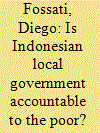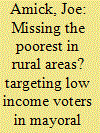| Srl | Item |
| 1 |
ID:
148517


|
|
|
|
|
| Summary/Abstract |
Since decentralization in 2001, Indonesian local governments have acquired a key role in poverty alleviation and social service delivery. The extent to which they have been able to meet this challenge is subject to debate, however, and systematic analysis of policy outcomes remains scarce. This paper contributes to the literature with a study of the district-level implementation of Jamkesmas, Indonesia's free healthcare program for the poor. Using original data on policy implementation, I show that local government is to some extent responsive to the needs of the most vulnerable. In years when local elections (pilkada) are implemented, low-income households are targeted more accurately, suggesting that electoral incentives for local elites may increase access to social services among the poor. However, I also show that the positive effect of local direct elections is limited to districts with electorally competitive politics.
|
|
|
|
|
|
|
|
|
|
|
|
|
|
|
|
| 2 |
ID:
160634


|
|
|
|
|
| Summary/Abstract |
This article utilizes an original household survey of two regency-level elections in Indonesia to explore campaign targeting. It uses a list experiment to show that direct survey questions about accepting transfers from campaigns elicit honest responses from respondents in Indonesia. Although the relationship between income and whether a respondent accepted transfers from political campaigns decreases over the entire distribution of income, it increases initially, producing a curvilinear relationship between income and accepting transfers from campaigns. This article argues that the poorest voters face barriers to being targeted by campaigns. However, these barriers recede as they become relatively richer, at which point a negative relationship is found due to diminishing marginal utility of accepting these transfers. Finally, in-kind transfers, as opposed to cash transfers, target low-income voters more effectively.
|
|
|
|
|
|
|
|
|
|
|
|
|
|
|
|